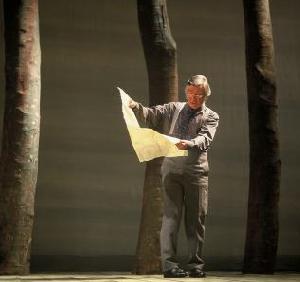SEARCH
REVIEWS
FEATURES
NEWS
Etcetera and
Short Term Listings
LISTINGS
Broadway
Off-Broadway
BOOKS and CDs
OTHER PLACES
Berkshires
London
LA/San Diego
Philadelphia
Elsewhere
QUOTES
On TKTS
LETTERS TO EDITOR
FILM
LINKS
MISCELLANEOUS
Free Updates
Masthead
Writing for us
A CurtainUp  London Review
London Review
 London Review
London ReviewThe Home Place
|
You know what the locals call us? . . . . The Lodgers
---- David |

Tom Courtenay as Christopher Gore
(Photo: Tom Lawlor) |
Set in Donegal in the summer of 1878, the land war is looming and the ascendancy of the resident English gentry is crumbling. Wealthy English landowner Christopher Gore (Tom Courtenay) seems largely sheltered from the angry rumblings of poverty in the neighbouring Irish countryside. With his son David (Hugh O'Conor), he tries to live with their "history and heritage and the awful burden". However, the brutal murder of a neighbouring English lord reveals the extent of the surrounding tension. Into this fraught atmosphere of fragile tranquillity, Christopher's ethnologist cousin Richard (Nick Dunning) arrives, replete with elaborate anthropometrical instruments and offensive assumptions of genetic superiority.
For many, Tom Courtenay's thoroughly sympathetic portrayal of a flawed man will be the pivotal success of the evening. In spite of enjoying privileged birth, class and wealth, Christopher Gore is essentially a victim of his hybrid Anglo-Irish heritage. With themes of conflicting loyalties coursing through the play, the gentlemanly yet timorous Christopher ultimately commits a form of treachery.
Nick Dunning plays Christopher's obtusely insensitive cousin. A fascinating character, Dr Richard Gore reflects the late nineteenth-century interest in anthropology which was closely linked to imperialistic attitudes. Considering the Irish "a primeval people really", his condescension is coupled with a colonial, conquering mindset. He is convinced that cranial measurements and physical characteristics can reveal empowering insights into the "secret vault of personality": "If we could break into that vaultů we wouldn't just control an empire, we would rule the entire universe." His three "specimens" are local people, representing a vista of the local community. Ragged, dirty and starving, they are three faces of impoverished Ireland: a widow begging for food, a boy who is cheekily outspoken, and a girl who is intimidated and silent.
Margaret O'Donnell (Derble Crotty) is the Gores' longstanding housekeeper. Her strong, stable character belies the fiercely dichotomous aspects of her identity. Obviously fond of and loyal to her employers, she nevertheless has a cousin who is dangerously linked to the seditious violence. Her father, Clement O'Donnell (finely played by Harry Towb) may be a drunken embarrassment to Margaret but is also the advocate of Thomas Moore's nobly patriotic songs. The local school choir's rendition of "Oft in the Stilly Night" floats across the stage from the distance and provides a tender, tentative hope for the future of a tormented nation.
The set is stunningly beautiful, portraying a parlour room on the periphery of an immense framed opening onto the outside land. This seems a visual reflection of England's presence in Ireland -- a partial and adequate colonisation. Slightly asymmetrically parallel tree trunks dominate the background. They are the "doomed trees" whose fate comes to represent Christopher's class. Planted years ago and apparently well-rooted in the land, they are now marked out for categorical destruction.
This sensitively intelligent play demonstrates why Friel is so successful a translator of Chekhov. Able to gauge the gently-blended tragicomic pathos of the Russian master, Friel reproduces this tone and transposes it to County Donegal. With affectionate nostalgia for Ireland and for an imminently extinct era, this play's scenario is realistic in itself but also emblematic of the general historical process. With a bright, homely earthiness, this play is at once insightful, subtle and moving.
| HOME PLACE
Written by Brian Friel Directed by Adrian Noble Starring: Tom Courtenay With: Derbhle Crotty, Laura Jane Laughlin, Adam Fergus, Michael Judd, Hugh O'Connor, Nick Dunning, Sean Murray, Harry Towb, Brenda Larby, Leagh Conwell, Joe Gunn, Nicky Mulligan, George Robinson, Reanna Calvert, Olivia Ford, Jodie McLaren Design: Peter McKintosh Lighting: Mark Henderson Sound: Gregory Clarke Running time: One hour 55 minutes with an interval Box Office: 0870 060 6644 Booking at the Comedy Theatre to 25th August 2005 Reviewed by Charlotte Loveridge based on 31st May performance at the Comedy Theatre, Panton Street, London W1 (Tube: Piccadilly Circus) |





